FZI AI Day 2025
Immerse yourself in the world of Artificial Intelligence
“In six thematic tracks, we bring together experts from research, business, and society—and create space for exchange about opportunities, challenges, and concrete use cases. Whether you’re just getting started or want to dive deeper, you can expect new ideas, fresh perspectives, and real starting points for potential collaboration.” This was the invitation to the FZI AI Day 2025. Around 60 guests accepted this invitation and immersed themselves in the world of applied Artificial Intelligence.
Experience how Artificial Intelligence is rethinking our world
The AI Day was opened by FZI Executive Director Jan Wiesenberger, who highlighted the importance of applied Artificial Intelligence, particularly for companies, and the contributions that research at the FZI can make in this area.
Dr. Bettina Laugwitz, Director and Global Lead of AI Ethics at SAP SE, answered questions in her keynote speech about how safe or dangerous AI actually is and how far we can trust AI. After all, trustworthy AI must be robust, legally sound, and safe to use. In her presentation, she demonstrated how an ethical perspective can foster the development of secure and sustainable AI systems and how this can be accomplished.
Tech Track Highlights
After a short break, the morning featured three TECH TRACKS on language models (LLMs), edge AI & neuromorphic hardware, and data strategy. These provided an opportunity for intensive discussion about opportunities, risks, and specific use cases.
TECH TRACK #1: Language Models (LLMs)
The first Tech Track on LLMs focused primarily on the secure and transparent use of language models, answering the question of how retrieval-augmented generation, prompting, and open source can be used for traceable AI in legal use cases. This is because the productive use of language models in regulated domains such as the legal system requires precise control, traceability, and context sensitivity.
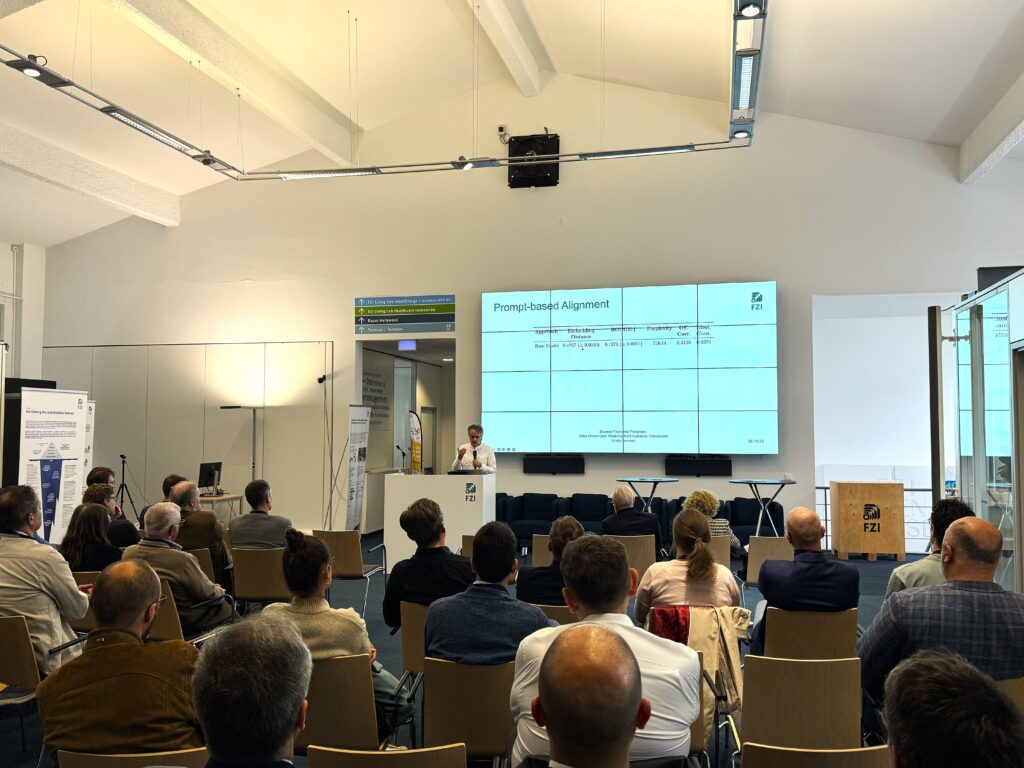
In this workshop, moderated by FZI AI Officers Maria Rill and Steffen Thoma as well as FZI Department Manager Jacob Langner, participants learned how current AI techniques—in particular retrieval-augmented generation (RAG), structured prompt engineering, and modular open-source components—can be combined into a system that automatically processes legal queries and provides reasoned, verifiable answers.
The “law” use case served as an exemplary scenario for the use of explainable, domain-specific controlled AI systems with high requirements for transparency and reliability.
Prof. Dr. Achim Rettinger from the University of Trier and director at the FZI, gave deeper insights into language models as a speaker in this track.
TECH TRACK #2: Edge AI & Neuromorphe Hardware
Tech Track 2 focused on how optimized hardware architectures for AI can be designed in edge and embedded systems. The use of artificial neural networks (ANNs) directly on edge and embedded systems offers decisive advantages in terms of latency, data protection, and independence from network infrastructure. At the same time, these systems place high demands on energy efficiency, security, and real-time processing – artificial neural networks with high standards!
Moderated by Dr. Sebastian Reiter, this track highlighted tool environments for customized hardware architectures, hardware-supported ANN acceleration, and principles of neuromorphic computing for the realization of intelligent embedded systems. Sven Nitzsche and Federico Peccia enriched the insight with concrete application examples from the process industry, mobility, and medical technology sectors, highlighting the potential for future cooperation with partners from research and industry.
TECH TRACK #3: Data Strategy
No data, no AI: What may sound trivial at first is essential for the successful use and development of AI in companies. In the third Tech Track of the morning, Alexander Dregger demonstrated how a data strategy can help accelerate the implementation of AI. This is especially true when companies seek to utilize AI in various areas.
After providing an overview of the various components required for a successful data strategy, he led an interactive discussion on criteria for evaluating data quality, which the participants developed themselves. An initial assessment of data readiness, either for the company or for a specific use case within the company, rounded off the practical track.
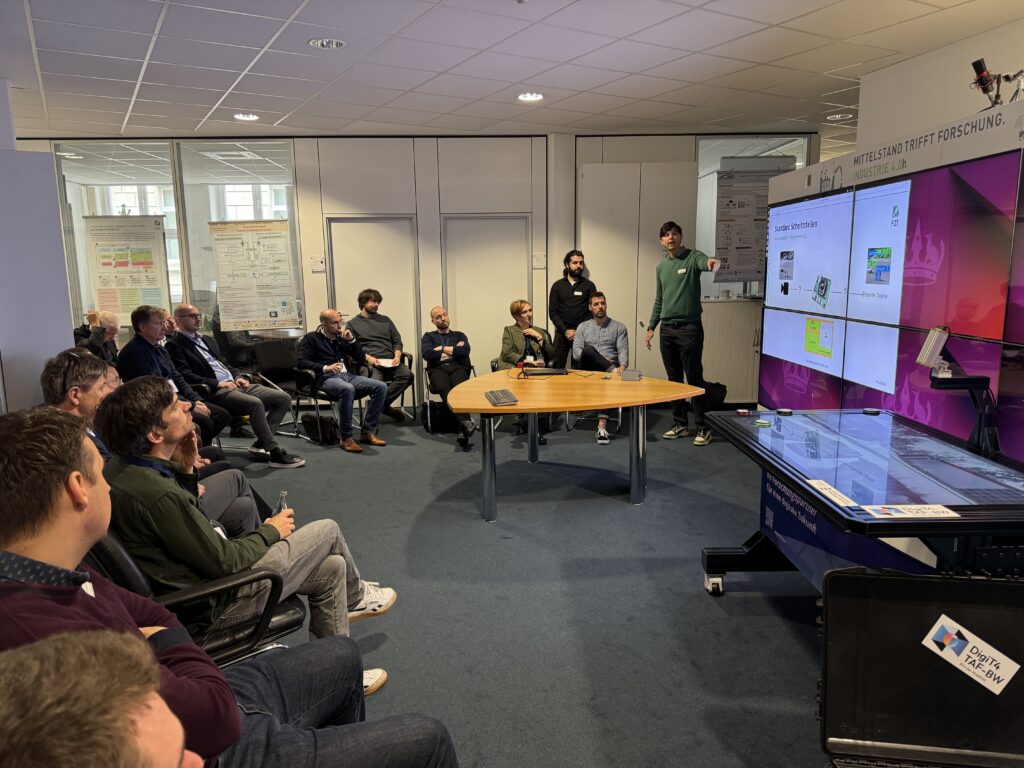
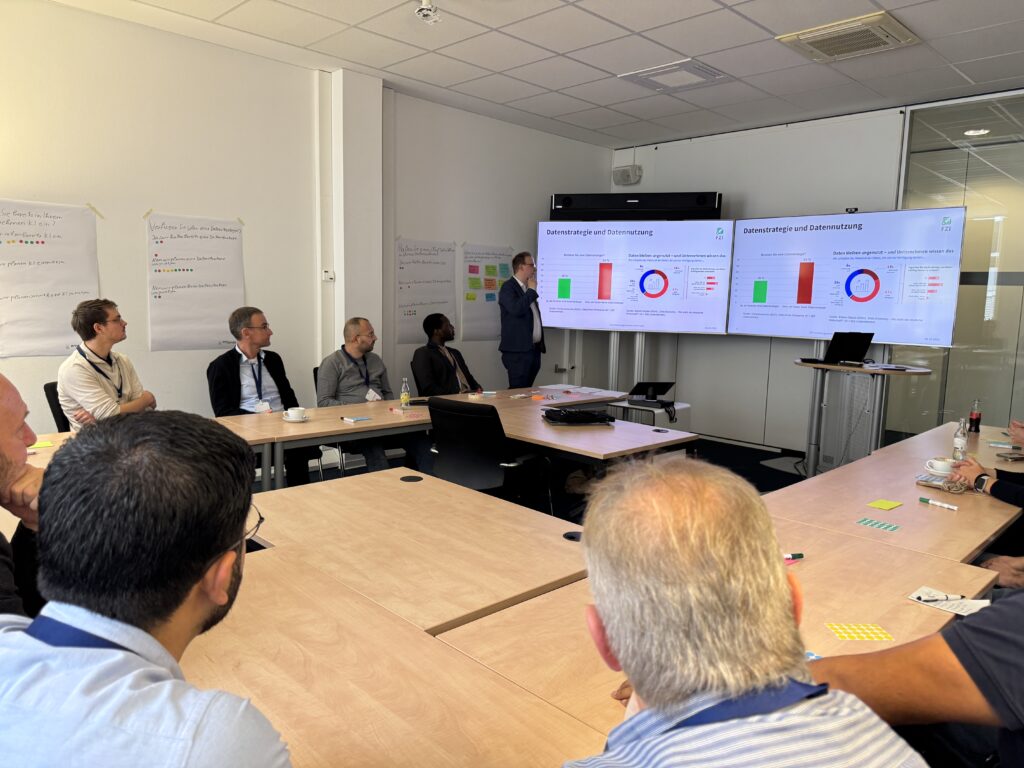
Tour of the FZI House of Living Labs, B2B matchmaking and application tracks
Hands-on research: During an exclusive tour focusing on Artificial Intelligence and its applications in research and practice, guests had the opportunity to experience our FZI Living Labs firsthand.
The subsequent B2B matchmaking event was already fully booked in advance: Under the motto “FROM IDEA TO COLLABORATION,” participants were able to discuss specific AI use cases or seek general advice in short, targeted conversations. Adamantia Goulandris quickly connected the event guests, facilitating exchanges and new contacts.
In the three APPLICATION TRACKS in the afternoon of the FZI AI Day, the focus then shifted to a deep dive into practical applications with specific use cases.
APPLICATION TRACK #1: Mobility
“Think. Trigger. Store. – AI-based data collection as a key technology for autonomous driving”: Under this motto, Christian Hubschneider and Jacob Langner dedicated this application track to the use of Artificial Intelligence in mobility.
They focused on selective data collection: Using trigger functions, not all data in the vehicle is recorded, but only data relevant to development is automatically stored in a targeted manner. The scientists utilize AI methods to automatically generate triggers based on data requirements and update them regularly after the collected data has been analyzed and evaluated. In the automated data collection pipeline, the collected data is then anonymized before being stored in the backend.
The two presenters demonstrated two different approaches to selective, AI-supported data collection and a continuous data pipeline including automated anonymization in the vehicle. The concepts and solutions were then demonstrated live on our FZI development vehicle, CoCarNextGen.
APPLICATION TRACK #2: Robotics & Industrial
In this application track, moderated by Dr. Georg Heppner, participants focused on adaptive robotic systems that make production, logistics, and everyday life more intelligent, efficient, and secure.
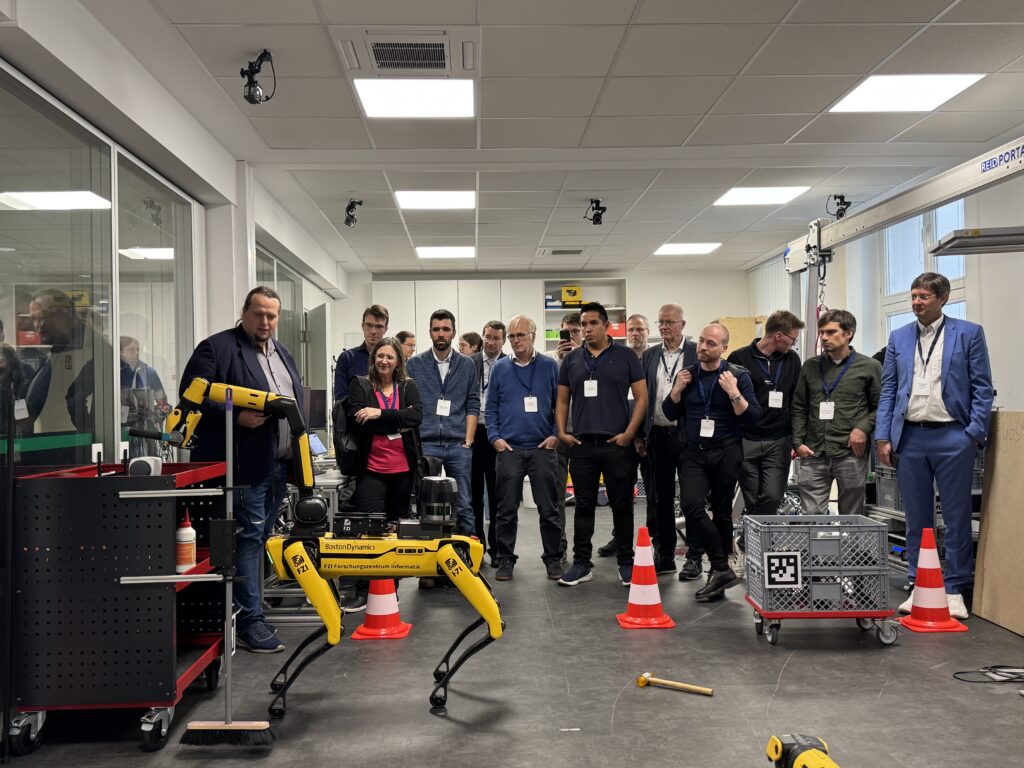
The FZI team presented its approach for an intelligent assistance system based on the Spot walking robot, which can perform various pick-up and delivery services on construction sites. The focus was particularly on how the system can learn new objects using AI and with only a small amount of training data, as well as its flexibility in complex environments.
Following Philipp Keller’s presentation on “Modern robotics in industrial applications – opportunities, challenges, and success stories,” the system was tested live, with participants helping to train it to recognize new objects and answering specific questions.
APPLICATION TRACK #3: Healthcare
The topic of the third application track of the day was how AI helps make medical applications practical, efficient, and future-proof. Moderated by Stefan Otten, insights were provided into how Artificial Intelligence is opening up new avenues for more efficient and patient-oriented healthcare.
The interactive track used specific applications to demonstrate how AI is already improving not only diagnostics, but also assistance systems and processes. At the same time, real challenges from hospitals, care facilities, and outpatient settings were addressed in order to derive tailor-made solutions.
The track focused on success stories, technical implementation, and knowledge transfer into healthcare practice, as well as the question of how AI can be sustainably integrated and continuously adapted to practical needs.
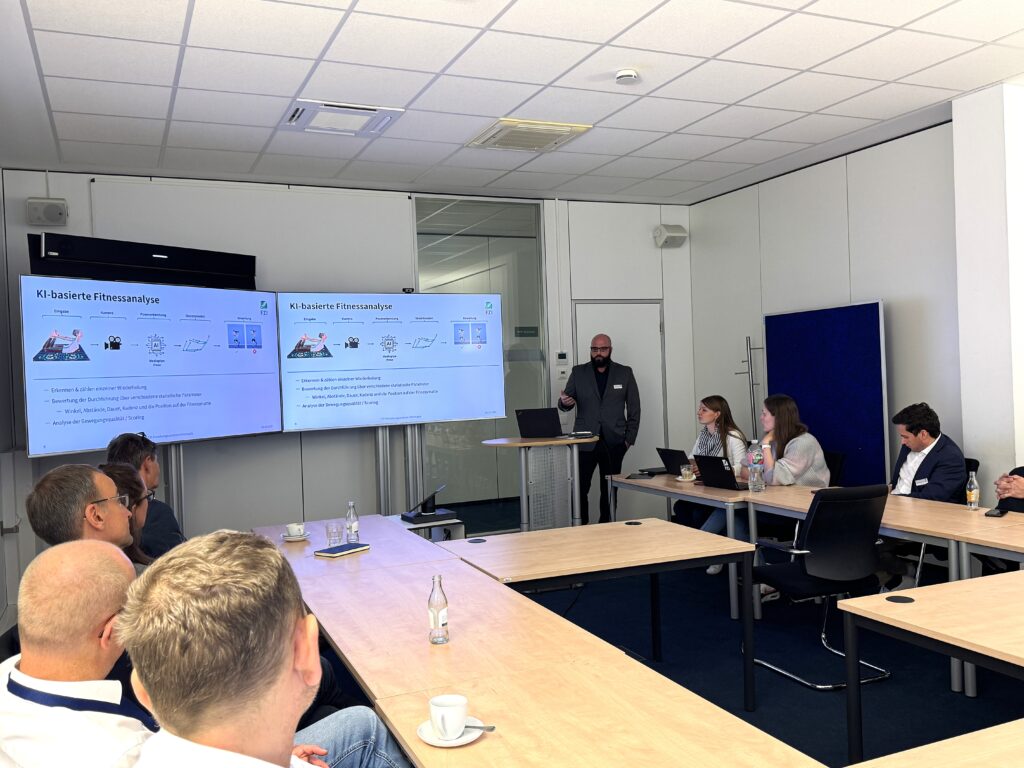
From 4 p.m. onwards, the day came to a relaxed close with drinks, snacks, and good conversation. Whether it was in-depth networking, casual conversation, or a brief review of the day’s highlights, guests took the opportunity to reflect on their impressions.
We would like to express our sincere thanks to everyone who helped organize our AI Day 2025!
